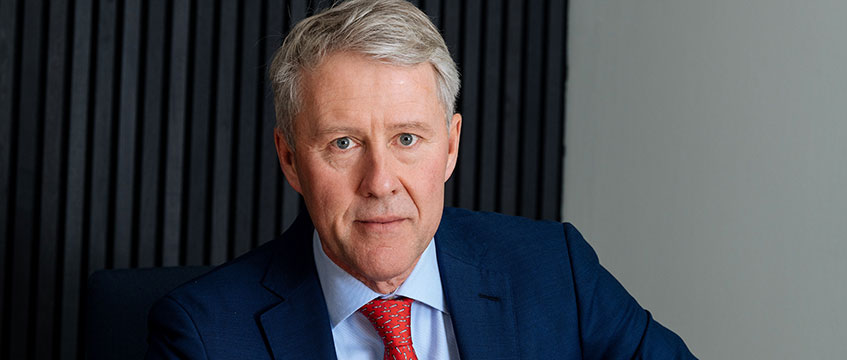If it’s tough in the town, is the country better? Farmers’ sons Richard Warburton and Carl Atkin think so. They expect rising EU farmland prices to pull €300m in to their new Palmer European Farmland Fund, a jv with PCP. By Helen McCormick.
Incongruous as they look perched on a tractor in a Cambridgeshire farmyard in their crisp suits and smart shoes, Richard Warburton and Carl Atkin are not afraid of a bit of mud. “Definitely not,” declares Warburton, indignant at the suggestion. “Unless there’s an EG photographer about.”
The two Bidwells partners – the most senior members of its agribusiness team – are both farmers’ sons, and began their careers with an agricultural degree and an MBA, before starting out in farm management. They are about to launch what they believe to be the first direct EU farmland fund, to take advantage of the fact that soaring food prices are pushing up agricultural land values, just as commercial and residential values are falling.
The Palmer European Farmland Fund is a 50:50 joint venture between the Munich-based European arm of Palmer Capital Partners, the fund management company led by Ray Palmer, and Cambridge agent Bidwells. It will be run under the joint directorship of Guy Barker, MD (Europe) at PCP, and Warburton.
The €300m fund is projecting an average net income return of 5.5% pa over 10 years. Combined with the expected capital growth, net returns could hit an attractive 10-15%.
Candle in sea of blackness
The fund is looking to invest in arable, dairy and vegetable land, with 20% in commercial forestry and infrastructure. So far, it has picked up €60m of investment – a long way off its target of €200m of equity and €100m of debt. “We’re trying to raise capital in the middle of financial turmoil, but this will be one of the few things that people can invest in at the moment – a sort of candle in a sea of blackness,” says Warburton.
Nevertheless, this does not seem the obvious time to launch an investment product, with debt near impossible to obtain and many investors battening down the hatches until the markets calm. Indeed, a rival farmland fund, albeit a quoted one, has already been shelved (see p61).
Warburton is aiming to close the fund at the end of November, and says a “big pipeline of assets” has been inspected. But PCP’s Barker admits that this launch date may well slip to early 2009, given how few investors are likely to be able to stump up the minimum €50m contribution.
“Am I sure I can do it by November? No, but I’m absolutely sure this fund is going to fly. We’re spending a lot of money at the moment bringing the structure together. We’re a small business, so we wouldn’t be doing that if we weren’t confident.”
PEFF is designed to attract German institutions, tapping into PCP’s expertise in this market, but Warburton says all parties are “really pleased” about the level of interest from UK institutions.
The germ of the idea was formed last autumn, says Barker. “I was looking for a new product. The problem with farmland as an institutional investment vehicle has always been that it has a very low running return, but if you look at Eastern Europe then it does become possible. My colleagues in London suggested I talk to Bidwells, which was coming at it from the other direction.”
Over in East Anglia, Bidwells had just produced a research report on soft commodities and was about to take it to the City. Barker’s phone call came at the right time for both businesses. “There’d been no interest from the capital markets in agriculture for a long time,” says Warburton. “But farming has become more profitable – crop prices are higher and look like they’re going to stay that way, and that has an impact on farmland values.”
Central and Eastern Europe
Atkin adds: “Agricultural real estate is not correlated to the same things as mainstream property, but has the same characteristics, being an inflationary hedge with good income and capital growth. It’s a really useful thing to have in your real estate allocation.”
The fund is targeting seven member states – the UK, France, Germany, Czech Republic, Hungary, Poland and Romania. After spectacular recent rises, UK farmland values have now stalled, based on Q3 research from Knight Frank. However, the largest proportion of the fund’s investment will be in Central and Eastern Europe. “All these countries are in the EU, so are politically and economically safe,” says Warburton.
The potential convergence of land prices across the EU is a big draw. “Some land in Central and Eastern Europe is 20% of the value of land in Western Europe, so there’s a clear case for convergence occurring, as has already happened in commercial and residential property,” he adds. “Farmland is behind the curve.”
Warburton does not expect fields in Eastern Europe to match the value of those in Western Europe for physical reasons – crop yields are lower and more volatile because of the climate. “But we do expect them to come to between 40% and 60% of western values, so there’s a heck of a long way to go. And those countries that have come into the EU will start to receive agricultural subsidies.”
The fund will be made up of around 30 assets of between €5m and €15m each. “We have contacts in these countries who keep us informed about potential assets, and people ring us up too,” says Warburton. “A lot of land in Eastern Europe is lying fallow, because there isn’t enough working capital out there to get it back into production.
“We sift through the opportunities and go and look at them – this is vital. Farmland differs greatly you can have totally brilliant and totally terrible land within 5 miles, so there’s no substitute for wandering round with a spade,” he laughs.
Bidwells’ 35-strong agribusiness team is the largest in the UK, and runs projects in Africa, Kazakhstan, South America and across Europe, as well as managing over 40,000ha in the UK.
Warburton believes this international expertise is essential for the fund. “Every country is different – tenancy legislation varies, there are foreign ownership restrictions, and you have to be able to understand the type of farming. There are no statistics for Central and Eastern Europe showing how many hectares have been traded, so you have to be in the market to have a feel for it.
“Where we can, we do things directly and, if we do use local partners, they will be carefully chosen, as they have to manage the asset as well as just find it.”
Atkin adds: “The nearest analogy is a turn-over plus rent scenario. You pay your contractor to work on your behalf, you take a first call on profits – effectively, a rental equivalent – and then there is profit-sharing on top. That ensures we do not dilute the fund’s real estate focus by exposing it to operational farming and the costs of men and machinery.”
Warburton believes others will copy the PEFF idea, but stresses that it will be difficult to pull it off. “This is a jv for good reasons. Bidwells can’t do the fund management and PCP can’t do the strategy, asset selection and management. There’s a clear need to bring together expertise.”
Barker brings more than a decade of ex-perience in working with German institutional investors. He was formerly head of Invesco’s pan-European real estate business before he spearheaded PCP’s move into Europe last September.
“I live in Prague and commute to Munich, so Central and Eastern Europe is my backyard and has been for the past 10 years.”
So, perhaps, this isn’t such a foolish time for such a team to be launching a new fund. “In some ways, we’d have liked to have been doing this a year earlier, because farmland values have gone up so strongly,” says Warburton. “The reality was we couldn’t have raised the capital. Only recently, with rising food prices in the news, can you go and talk to institutions and they understand what you’re talking about.”
Schroders fund to lie fallow
Schroders has deferred the launch of its listed Agricultural Land Investment Co – a fund advised by Bidwells and originally due to be launched this month – citing poor economic and stock market conditions.
PCP’s Guy Barker says the delay does not worry him. “The problem is that it decided to go for a quoted product, and nothing is placeable in the stock market at the moment. It’s nothing to do with the product idea, which is fine. I think, however, that Schroders could do it if it was done as a private equity vehicle, and I suspect it may get to that point.”
The business model for the Schroders fund is to invest in operating businesses and funds that invest in real estate, with no direct investment. “Delaying the launch removes a potential client for us but, on the other hand, it also removes a potentially competing product to the Palmer European Farmland Fund,” adds Barker.










